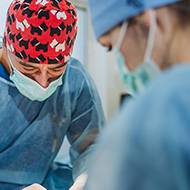
Vets urged to continue working in small teams.
Veterinary professionals are being urged to continue working in small teams and to support neighbouring practices amid the introduction of COVID-19 contact tracing programmes.
The advice from the BVA comes as the UK launches contact tracing programmes to move from blanket lockdown restrictions to a more targetted approach.
Although different for each nation, each programme asks those who test positive for COVID-19 to identify people they have been in recent contact with. Those people will then be contacted and asked to self-isolate for 14 days.
'Relevant contact' is defined as spending over 15 minutes within two meters of another person or being in face-to-face contact (less than one meter) with them. As long as they meet the eligibility conditions, employees in self-isolation are entitled to Statutory Sick Pay for each day they are in isolation.
BVA president Daniella Dos Santos said the programmes could have a significant impact on the provision of veterinary services and has called on teams to continue working in small groups 'as much as possible' to reduce the risk of transmission.
“The next step in the Covid-19 response is shifting to a more targeted approach, but it’s clear that this could have a very significant impact on individual veterinary practices if a member of the team tests positive,” she said. “The nature of veterinary work means we are in close contact with our colleagues in order to work safely with animals.
“Many veterinary teams will be understandably anxious about the impact on their ability to staff a full rota to maintain 24/7 care. And there are significant concerns about the impact on animal health and welfare if practices are unable to provide veterinary services.
“Our advice is to continue working in fixed pairs or small teams as much as possible to reduce your contact with different individuals and continue to practise good hygiene and biosecurity."
She conitnued: “We continue to ask neighbouring practices to work together to support those impacted by self-isolation and ensure full geographical cover for veterinary services. We recognise some veterinary professionals will be worried, but we urge everyone to comply with the contact tracing programmes.”



 FIVP has shared a survey, inviting those working in independent practice to share their views on the CMA's proposed remedies.
FIVP has shared a survey, inviting those working in independent practice to share their views on the CMA's proposed remedies.